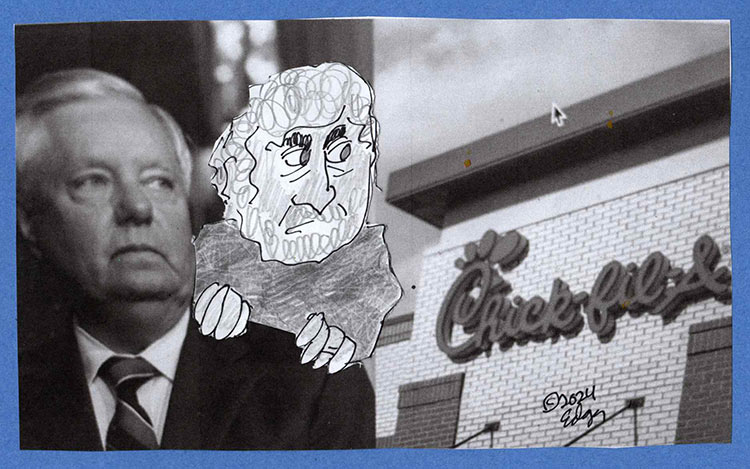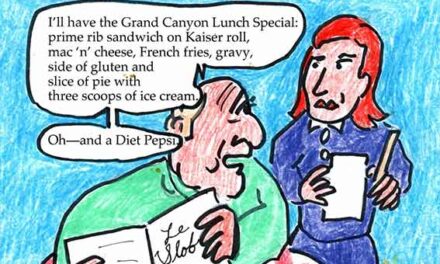Chick fil-A Is Back in the News! This Time, For Daring to Be Closed
A two-lane blacktop reverie
By Ed Goldman
It was reported recently that Chick-fill-A, the fast-food poultry joint, miffed some motorists because the company’s rest-stop outlets aren’t open on Sundays.
In fact, anyone familiar with the franchise would know that none of its 3,049 eateries are open on the Christian sabbath, just as we also know its owner is opposed to same-sex marriage.
Two for justice
To recap, if you hope to marry your same-sex partner, don’t plan on Chick-fil-A catering the nuptials—and especially not on a Sunday.
The story should have ended there but, of course, politicos hungry for more than the restaurant’s waffle fries have been turning it into a cause:
– Those opposed to Chick-fil-A’s opening and closing its doors whenever it feels like it are expressing righteous indignation that any restaurant given the opportunity to operate at a sort-of state-sanctioned rest stop ought to be open 24/7.
– On the side of Heaven and free trade we have, as usual, Senator Lindsey Graham of South Carolina, who not only sides with Chick-fil-A’s God-given right to deny wayfarers their Sunday sustenance but also poses in front of its sign.
I confess that as of this writing, I’ve never eaten at a Chick-fil-A. So I enter this somewhat meaningless fray interested more in rest stops in general than chicken consumption or sexual orientation. For the record, though, I’m pro-choice in both categories. I’ll even go one step further, mainly in the hope that it will spark controversy and increase readership: I believe one’s preferences for chicken and gender are present at birth, whereas veganism and intolerance must be learned.
Okay, then.
Growing up, I thought a truck stop was the same as a rest stop. You can’t blame me. Every time I drove into a rest stop there was an unaffiliated fleet of trucks parked beside, behind and in front of it.
The popular myth—promoted by my parents as well as travel magazines and the trucking industry itself—was that the food at a truck stop was far superior to that of an anonymous or even chain diner just off the freeway. There wasn’t even a caveat provided—namely that truckers demanded hearty, not heart-healthy food. Meat, potatoes, gravy, rolls, pancakes, bacon, and sausage comprised the cuisine rather than salads, cottage cheese and fruit cocktails.
The result was that when my families (the one I grew up with and the one I helped create) paused for a bite on long drives, I steered us to truck stops under the assumption there’d be white tablecloths and napkins, fussy wines, and maybe cassoulet, quiche and vichyssoise on the menu. No dice. It was Denny’s without the consistency a chain can impose on its outlets. A Grand Slam breakfast is pretty much the same meal at every Denny’s.
Actual rest stops, I discovered with age and sitting behind the steering wheel far too often, were simply that: bathrooms (sometimes with a shower you used at your own peril), a few trees posing as a serene greenbelt, a water hose for your hissing radiator and, in the optimum scenarios, soda and candy machines. There’s nothing like loading up on sugar and liquid then getting back on the freeway, especially when you encounter a sign that says, “Next Restrooms And Gasoline: 78 Miles.”
When I pull into a truck stop along a particularly dismal stretch of freeway or highway, I always wonder where the people who work there live.
It has to be some miles away, over that bramble-bush hillock several hundred yards in the distance. What’s their commute like? Is there a little dirt road snaking up the hillock that I can’t see? Do they live in houses, apartments, mobile-home parks or yurts? And when the weather’s lousy, do they show up at work anyway? Do they really drive 78 miles each way to get gas?
These are the questions that go through my mind on long Sunday drives, searching in vain for an open Chick-fil-A.
Ed Goldman's column appears almost every Monday, Wednesday and Friday. A former daily columnist for the Sacramento Business Journal, as well as monthly columnist for Sacramento Magazine and Comstock’s Business Magazine, he’s the author of five books, two plays and one musical (so far).













